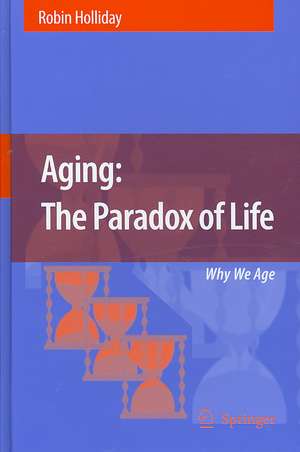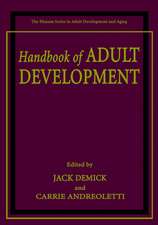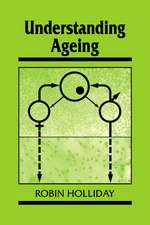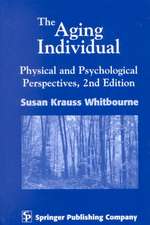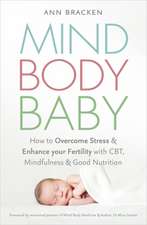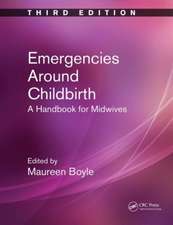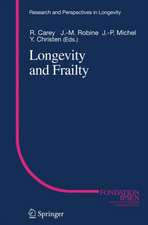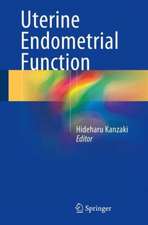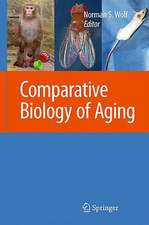Aging: The Paradox of Life: Why We Age
Autor Robin Hollidayen Limba Engleză Hardback – 30 mar 2007
| Toate formatele și edițiile | Preț | Express |
|---|---|---|
| Paperback (1) | 707.69 lei 6-8 săpt. | |
| SPRINGER NETHERLANDS – 10 noi 2010 | 707.69 lei 6-8 săpt. | |
| Hardback (1) | 715.91 lei 6-8 săpt. | |
| SPRINGER NETHERLANDS – 30 mar 2007 | 715.91 lei 6-8 săpt. |
Preț: 715.91 lei
Preț vechi: 753.60 lei
-5% Nou
Puncte Express: 1074
Preț estimativ în valută:
137.00€ • 142.17$ • 114.51£
137.00€ • 142.17$ • 114.51£
Carte tipărită la comandă
Livrare economică 17-31 martie
Preluare comenzi: 021 569.72.76
Specificații
ISBN-13: 9781402056406
ISBN-10: 1402056400
Pagini: 148
Ilustrații: XIV, 134 p.
Dimensiuni: 155 x 235 x 14 mm
Greutate: 0.42 kg
Ediția:2007
Editura: SPRINGER NETHERLANDS
Colecția Springer
Locul publicării:Dordrecht, Netherlands
ISBN-10: 1402056400
Pagini: 148
Ilustrații: XIV, 134 p.
Dimensiuni: 155 x 235 x 14 mm
Greutate: 0.42 kg
Ediția:2007
Editura: SPRINGER NETHERLANDS
Colecția Springer
Locul publicării:Dordrecht, Netherlands
Public țintă
ResearchCuprins
Longevity.- Body Architecture.- Maintenance of the Body.- Multiple Causes.- The Ancient Origins of Ageing.- Mice and Men.- How Many Genes?.- The Evolution of Human Longevity.- Myths of Life Extension.- Doctors’ Dilemma.- The Modulation of Longevity.- Ageing and the Angels.- Longevity, Population Pressure and Warfare.- Dialogue between Life and Death.- The Road to Discovery.- Resolution of the Paradox.
Recenzii
From the reviews:
"Aging: The Paradox of Life, a new book by the scientist Robin Holliday, dispels ignorance by explaining in non-technical language the reasons for aging and the myth of excessive prolongation of life. He writes in an engaging style and with clarity, appealing to the general public and scientists alike." (Medical News Today, July, 2007)
"A slim book that serves as a reality check for the hyperbole and misinformation surrounding attempts at slowing or preventing senescence. … Written in mostly nontechnical language for a general audience, the book consists of 16 brief chapters, a short list of scientific references, and a glossary. … Aging: The Paradox of Life capitalizes on a fascinating topic of interest to everyone. The book is a quick read but geared toward a general audience … ." (Tony Miksanek, Journal of the American Medical Association, Vol. 298 (4), 2007)
"Aging is no longer an unsolved problem in biology … . The book succeeds in one regard … questions and others important in aging research are introduced in language accessible to the non-expert … . It seems likely that most researchers in the aging filed would agree with the author … . In the end, we are left with a colorful and entertaining just-so story about aging, evolution and the meaning of life that provides insight into the world-view of the author … ." (John Tower, BioEssays, Vol. 29 (11), 2007)
"Books about ageing are coming thick and fast as the implications of an ageing population become evident. Many are for academics, while others aim for a popular audience. This book attempts to reach both. … Would I recommend this book to students? Yes … . Would I recommend it to a layperson? Again, yes. … it is a good read." (Anthea Tinker, Times Higher Education Supplement, November, 2007)
"This is a single-authored discussion of aging, its causes, mechanisms, and implications, written for a lay public. Its purposeis to explain the mechanisms of aging and to dispel exaggerated claims of anti-aging medicine. These are worthy objectives and the book meets them all in style. … The elegant British style of biological writing evident here makes this book a particular pleasure to read. For those working in the field of aging without an extensive biomedical background, this is a really excellent read." (David O. Staats, Doody’s Review Service, April, 2008)
"This is a short popular book written by a famous geneticist and biogerontologist. ... In just 132 pages, he presents to general readers his personal understanding of the biological aging process ... and many other topics, such as the origin of religion and human warfare. ... Overall, this volume may be of interest to the general public, as it helps to balance the current bold optimistic expectations for the future of human life span and life extension with a healthy dose of skepticism." (Leonid A. Gavrilov and Natalia S. Gavrilova, The Quarterly Review of Biology, Vol. 83 (3), September, 2008)
"Aging: The Paradox of Life, a new book by the scientist Robin Holliday, dispels ignorance by explaining in non-technical language the reasons for aging and the myth of excessive prolongation of life. He writes in an engaging style and with clarity, appealing to the general public and scientists alike." (Medical News Today, July, 2007)
"A slim book that serves as a reality check for the hyperbole and misinformation surrounding attempts at slowing or preventing senescence. … Written in mostly nontechnical language for a general audience, the book consists of 16 brief chapters, a short list of scientific references, and a glossary. … Aging: The Paradox of Life capitalizes on a fascinating topic of interest to everyone. The book is a quick read but geared toward a general audience … ." (Tony Miksanek, Journal of the American Medical Association, Vol. 298 (4), 2007)
"Aging is no longer an unsolved problem in biology … . The book succeeds in one regard … questions and others important in aging research are introduced in language accessible to the non-expert … . It seems likely that most researchers in the aging filed would agree with the author … . In the end, we are left with a colorful and entertaining just-so story about aging, evolution and the meaning of life that provides insight into the world-view of the author … ." (John Tower, BioEssays, Vol. 29 (11), 2007)
"Books about ageing are coming thick and fast as the implications of an ageing population become evident. Many are for academics, while others aim for a popular audience. This book attempts to reach both. … Would I recommend this book to students? Yes … . Would I recommend it to a layperson? Again, yes. … it is a good read." (Anthea Tinker, Times Higher Education Supplement, November, 2007)
"This is a single-authored discussion of aging, its causes, mechanisms, and implications, written for a lay public. Its purposeis to explain the mechanisms of aging and to dispel exaggerated claims of anti-aging medicine. These are worthy objectives and the book meets them all in style. … The elegant British style of biological writing evident here makes this book a particular pleasure to read. For those working in the field of aging without an extensive biomedical background, this is a really excellent read." (David O. Staats, Doody’s Review Service, April, 2008)
"This is a short popular book written by a famous geneticist and biogerontologist. ... In just 132 pages, he presents to general readers his personal understanding of the biological aging process ... and many other topics, such as the origin of religion and human warfare. ... Overall, this volume may be of interest to the general public, as it helps to balance the current bold optimistic expectations for the future of human life span and life extension with a healthy dose of skepticism." (Leonid A. Gavrilov and Natalia S. Gavrilova, The Quarterly Review of Biology, Vol. 83 (3), September, 2008)
Caracteristici
The first overview of the topic written in non-technical language Because it avoids technical terminology, it is easily readable Covers a lot of ground that can only be found in specialised monographs or journals The author has a wide ranging knowledge of all the important areas of biology Also discusses ageing and longevity in relation to human activities such as religion and war
